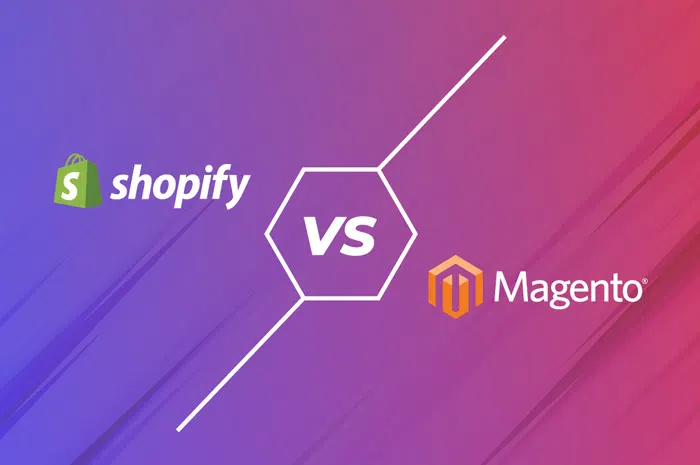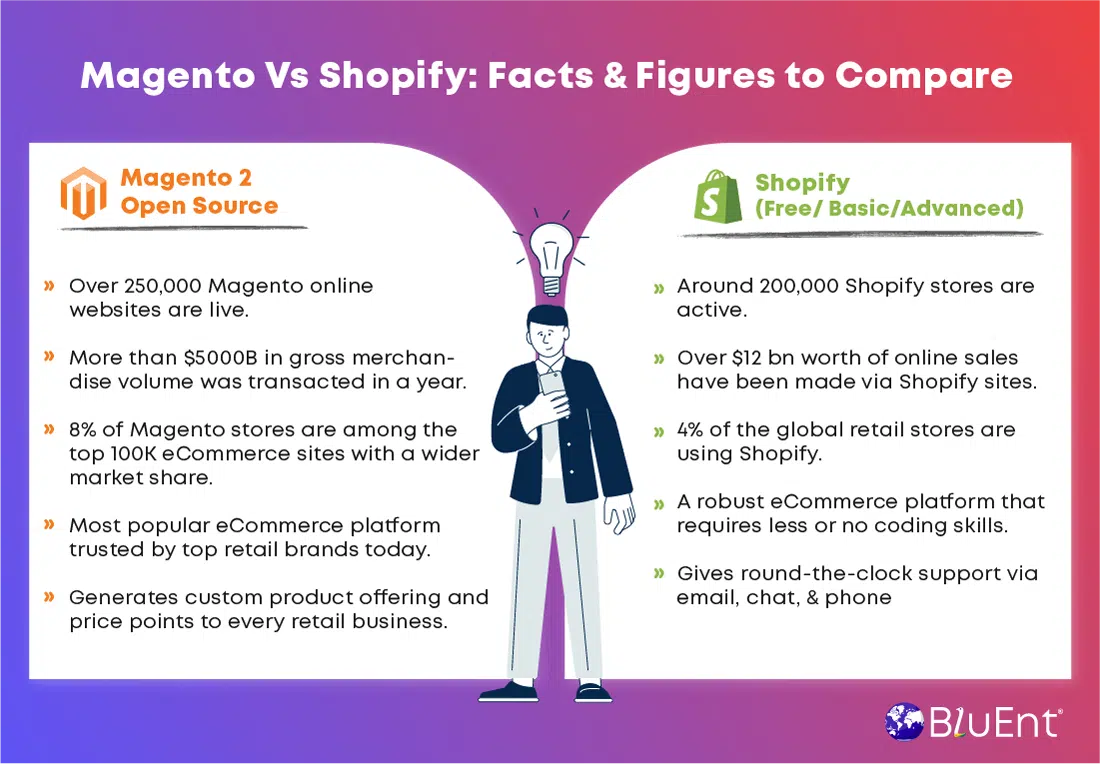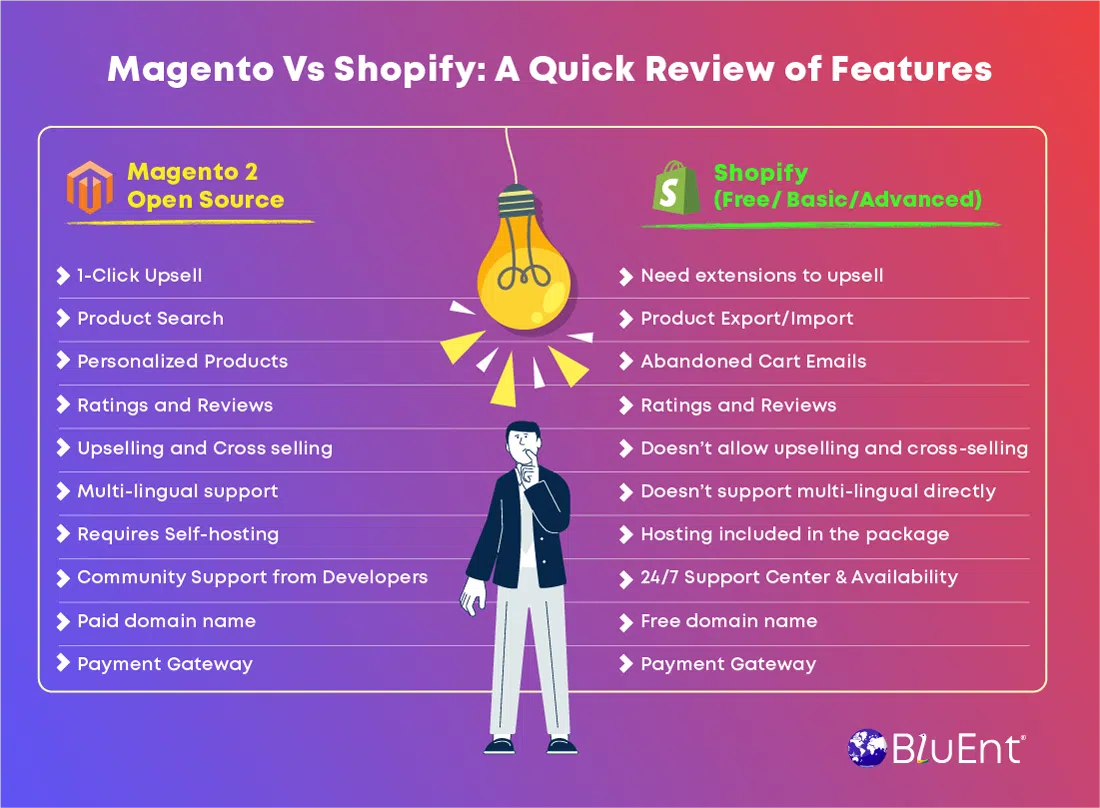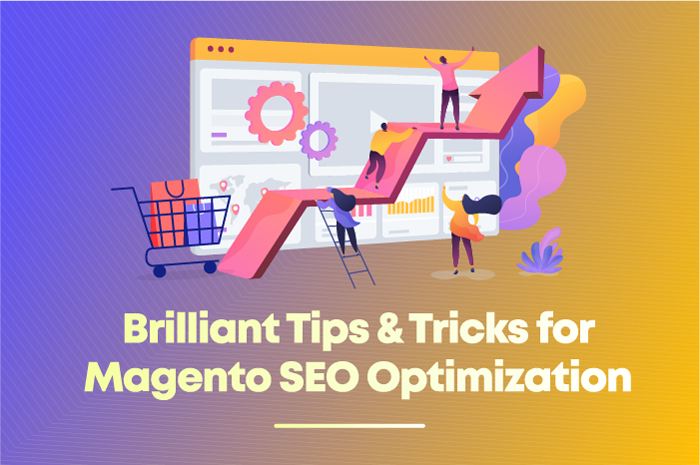The debate of Magento vs Shopify is catching the interest of the global eCommerce industry. From retail brands to leading eCommerce web development experts, the technology world desires to discover which one is superior between these two platforms.
Both Magento and Shopify are powerhouses among leading eCommerce stores in the retail landscape. Most developers see Shopify and Magento as their first preferences for online store development. However, choosing one is a difficult decision for many.
Over 239,000 online stores currently use Magento (Adobe Commerce). On the other hand, Shopify powers nearly 4.25 million eCommerce sites, out of which over 64% are US-based sellers.
If you go by these numbers alone, then Shopify seems to be a winner; however, it's not open-source like Magento. Magento, like WordPress, is free to install, but demands web hosting investments.
There is not just one point to keep in mind when choosing one among these two eCommerce giants.
Like every ambitious retail business, you must be curious to know which eCommerce platform dominates the other.
So, let's start with our exclusive debate on Magento vs Shopify now!
Table of Contents:
Magento and Shopify: Quick Facts & Figures to Compare
In our debate on Magento vs Shopify eCommerce technologies, let's begin with some stats and facts to figure out which one is actually more popular.
-
The market share of Magento eCommerce is 1.72%, whereas Shopify holds around 10%, according to Statista.
-
The user base of Shopify is comparatively higher than Magento. However, merchants using Magento run high-traffic sites. Most Shopify sites get less traffic, as per Web Technology Surveys.
-
As far as market reach is concerned, more than 1.7 million businesses across 175 countries are using Shopify, while more than 315,000 Magento sites are active across global industries. As per a report, Magento users are retailers from healthcare, fashion, electronics, beauty, sports, pharmaceuticals, & more.
With that out of the way, let's throw some light on Magento and Shopify pros and cons.
Magento vs Shopify: Introduction with Pros and Cons
Choosing the best eCommerce platform for your business is a bit difficult when Magento and Shopify are the major options.
Magento is a popular eCommerce platform that offers flexibility, scalability, and ease of use. Small retailers and enterprises hire expert developers to get custom Magento solutions as per their business needs.
At present, Magento is available as Adobe Commerce with two editions: Magento Commerce and Magento Open Source.
-
Magento Commerce is an all-inclusive package for online retailers who tend to optimize their existing eCommerce sites for high sales.
-
Magento Open Source is a one-stop solution for retailers wanting to set up their online shop from scratch. It's a free and self-hosted platform to build your shopping website with unique features.
When it comes to Shopify, it's an ideal web development tool to build an eCommerce website with no coding effort. At present, retailers can opt for these two offers at any reputed Shopify development company in the US:
-
Shopify is the basic free version that allows businesses to optimize their online stores and boost their sales & customer experience.
-
Shopify Plus is a premium version that brings a range of features covering must-haves for starting an eCommerce business. It offers value-added services including multi-channel support, payment options, web and blog support, web performance and analytics, & more.
Recommended Reading:
Magento Pros and Cons
| Magento Pros | Magento Cons |
|---|---|
| Wide community of developers available to support emerging retailers & startups. | Not ideal for beginners or those with limited or no coding knowledge. |
| Offers the flexibility to customize and build your store as imagined. | One needs to practice & learn using this platform to make the most out of it. |
| Comprises a set of stunning themes & extensions to make your online store stand out. | Installation process needs professional expertise & may take longer than expected. |
| Free to use and open source. | Store setups may turn pricey. |
| Provides multiple extensions to choose from. |
Shopify Pros and Cons
| Shopify Pros | Shopify Cons |
|---|---|
| Supports multi-channel selling practices on global eCommerce platforms including Facebook, eBay, Amazon, etc. | Takes a transaction fee for every payment made via any mode you choose except Shopify payments. |
| Includes a range of striking and responsive themes. | Most themes in Shopify plans are premium. |
| No coding knowledge required. | Integrating third-party apps may get difficult for some Shopify users. |
| Large community and 24/7 customer support. | |
| Allows multiple payment gateway integrations. |
Besides these, you can also consider the pros and cons of the WooCommerce plugin for eCommerce platform development.
Worried about your retail sales? Know how Shopify can help you deal with eCommerce challenges!
Learn moreNow let's get back to the topic & cover other perspectives of the Magento vs Shopify debate!
Magento or Shopify, Which eCommerce Platform is Better?
Being familiar with the pros and cons of Magento vs Shopify is necessary for every eCommerce business. However, one also needs to consider other parameters to make the right judgment.
Let's see some points on Magento & Shopify to compare them. This will also serve as a guide to choosing the best eCommerce platforms for your business.
Features
Both Shopify and Magento come with a bucketful of features including themes and extensions. Let's discuss them one by one.
Magento
-
Faster checkout: Reduces the multi-step checkout process indicating why you are not able to convert your eCommerce web traffic into sales.
-
Payment processing: Allows easy payment gateway integration for more than 300 platforms including Paypal and Braintree.
-
Site management: Provides a multi-store management facility to monitor various stores as a single admin.
-
Analytics: Gives access to 100+ predefined reports & 9 reporting dashboards to let you create, edit, & view reports.
-
Multiple add-ons: Offers more than 4,500 unique themes & extensions to boost eCommerce user experience on your store.
Shopify
-
Shopify payments: A payment processor that makes your transactions convenient & charge-free.
-
Website blogging: To publish related blog posts and engage visitors for promotional benefits.
-
Abandoned checkout alerts: To recover incomplete checkout by notifying customers via email or text messages.
-
Auto taxation: To auto-update payments & tax deductions as per the country and state rates.
-
App store: Offers 7000+ apps to integrate other features such as personalized email marketing, shipping, or other functions in your store.
Ease of Use
Choosing a user-friendly technology for shopping website development will reduce coding efforts. And if we compare Magento and Shopify based on ease-of-use then it's clear that:
Magento needs a learning curve as you need to write codes to build your online store. Its complexity score is higher than Shopify which supports drag-and-drop functionality.
It means that you need to hire a web developer with Magento as it needs technical abilities. And hence, choosing Shopify is a great idea if you want to DIY your eCommerce web development.
Result: Shopify wins over Magento for being more user-friendly.
Themes & Templates
User experience plays a crucial role in sales & engagement. 48% of web visitors say that the credibility of the website depends on its appearance & overall look. Perhaps, that may be a reason why retailers hire experts to get custom eCommerce solutions.
And to make them more engaging, they prefer to choose between Magento and Shopify.
Both Shopify & Magento bring a big collection of themes & templates to add a classic touch to your store.
However, Shopify has 10 free and 64 paid themes. The Shopify pricing for these themes will vary from $140 to $180 each. As these themes are stunning and responsive, using them will make your site look awesome across any device & screen. And hence, it blends with a secret recipe to a great UI/UX mobile app experience.
On the other hand, Magento challenges Shopify with its ready-made themes needing no extra effort in installation. But the cost of these ready-to-use themes can go up to $100 each. And the Magento pricing for custom themes will range between $600 to $25,000.
Result: Shopify is more cost-effective than Magento in terms of themes & extensions. Magento is ideal for big brands & retailers with high budget value.
Pricing
Besides the cost of themes & extensions, the pricing package of Magento and Shopify is one more factor to consider.
Well, Magento doesn't require a monthly premium. It's open-source software and free to use. However, it charges users for domain and hosting services. And the Magento pricing for added features starts from $15,000.
Whereas the Shopify pricing model is based on subscription. The average cost will range between $39 to $399 in a month. The best thing is that you don't need to pay any additional amount for domain & hosting services.
Result: There is a minor difference in the Magento and Shopify pricing. Shopify somehow seems more affordable than Magento if you're not using custom themes & apps.
Payment Processors & Transactions
Both Shopify and Magento have in-built payment processors. It means that anyone can integrate payment processors using these platforms into online shopping apps for eCommerce businesses.
But which one is the best for you?
Note that Shopify offers its payment gateway, Shopify Payments. It will not charge merchants for using this payment mode. It means that one must be paying a transaction fee for using other payment methods including Amazon Pay, PayPal, & Apple Pay.
Magento wins over Shopify in this case. It supports more than 150 payment gateways. Anyone can install and integrate these third-party payment processors on Magento.
Result: Magento is lesser expensive & better option to simplify payment gateway in eCommerce web development over Shopify.
Set up your online store with scalable & cost-effective Magento solutions
Get our Magento servicesSearch Engine Optimization
Worried about how to increase website traffic in your store? It's high time to invest in digital marketing for higher sales & ROI.
The benefit of SEO optimization for sales will not only boost your online presence but also multiply revenues. And both Magento and Shopify are good at it.
So, which one is more beneficial from an SEO perspective, Magento or Shopify?
Note that Magento provides guides to optimize your search engine rankings. It also educates users on how to optimize alt tags and URLs to improve their sites' visibility on Google.
And if we talk about Shopify, it depends on external apps to help you implement SEO tricks.
Result: Magento is one step ahead of Shopify's ability to give SEO support.
Help and Support
If you don't want to compromise your eCommerce success, then you must prioritize customer lifetime value. And you can achieve that by ensuring quick customer support services.
Quality customer support matters a lot for any retail business. Whether you're working with a Magento developer or a dedicated Shopify development team, both eCommerce platforms offer customer support.
However, Shopify provides additional support from:
-
Community forums
-
24/7 on-call support
-
Email support
-
24/7 live chat support
-
Social media support
-
Video tutorials & guides
-
Help Center
And Magento gives access to a large community of developers to help you build your dream store. Instead of a dedicated support team, Magento encourages users to explore step-by-step guides from industry experts.
Result- Magento is a clear winner here. After all, it gives user-generated guides from experts who are working on this technology in real.
Recommended Reading:
Magento vs Shopify: A Final Verdict from Experts at BluEnt
At this final phase of the Magento-Shopify battle, we can say that both are strong contenders in the list of top eCommerce platforms.
However, our experts at BluEnt suggest that going for Shopify to Magento migration is ideal if you're skilled at coding. Furthermore, if you're already a leading brand with global reach, then Magento is the right choice for you.
We suggest choosing Shopify if you're just entering the retail segment & want to launch your store in no time. Even if you want Magento to Shopify migration, this is possible.
The best approach is to hire the right technology partner excelling in Magento, Shopify, WooCommerce, & other open-source platforms for eCommerce development. And BluEnt is the one you can rely on!
Our service offerings include mobile app development, web design & development, portal development, software consulting & development, product development, and web app development. Want to learn more about us? Connect now!
To see our work, visit our portfolio to go through our latest projects at a glance!
Frequently Asked Questions
Does using Magento and Shopify together make sense?
It's not possible! Both eCommerce platforms are independent website builders with their features and benefits. Magento is more like an open-source CMS while Shopify is a professional website-building tool. They can't be used at the same time.
Which one is more secure, Magento or Shopify?
Magento seems to be winning this comparison as it features two-factor authentication, custom admin panels, and many security options.






 Proven Magento SEO Tips to Rank High on Search Engines
Proven Magento SEO Tips to Rank High on Search Engines  10 Best Magento Extensions to Achieve eCommerce Excellence.
10 Best Magento Extensions to Achieve eCommerce Excellence.  Unlock the power of ChatGPT for business data analytics!
Unlock the power of ChatGPT for business data analytics!  How Do the Fashion and Retail Industries Hire the Best Shopify Developers?
How Do the Fashion and Retail Industries Hire the Best Shopify Developers? 